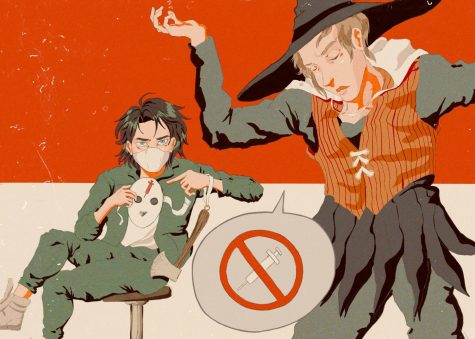Awkward: How do you approach the topic of vaccination status to keep social gatherings safe?
October 21, 2021

You are terrified of your upcoming Halloween party, but not for the fun reasons.
This year, you’re requiring guests to have full COVID-19 vaccination cards and masks to make sure no one contracts the virus on your account this spooky season. But, you’ve heard the horror stories — “Carmine’s hostess attacked after asking diners for proof of vaccination,” “Man drives into workers at COVID vaccination clinic during brazen attack in California,” “Man ambushes National Guard soldiers transporting COVID vaccines, holds them at gunpoint.”
“What if you’re next?” you wonder. You’re trying to keep the gathering small and safe, but a few friends are bringing partners you’ve never met, and you worry if any of them are anti-vaccine.
You start to assume the worst after marathoning horror movies — what if you ask if a guest brought their vaccination card, but they didn’t, so they leave and you think everything is fine, but then they come back later and stab you in the shower like in that horror movie, “Psycho”?
In a political climate where an anti-vaxxer has the potential to be the scariest person you encounter this Halloween, how do you check if someone is vaccinated while keeping your peace of mind? The Chronicle spoke with communication and etiquette experts to find out.
Sylvia Mikucki-Enyart, associate professor at the University of Iowa in the Communication Studies Department, said if you are unsure how someone will react, you can center the question around yourself.
For example, you could say your household is being extra cautious, and you’ve been locked down and careful since the beginning of the pandemic, so you just wanted to ask if they’re vaccinated. Or you could check ahead and tell your friend everyone you’ve been hanging out with is fully vaccinated, so you’re reaching out to make sure your plans with them can still take place.
Mikucki-Enyart said even if you go this indirect route, make sure you get a direct answer.
“[I heard about a situation where] some parents had asked an extended family member, ‘We’re only hanging out with vaccinated people,’ and the people replied, ‘Oh, we’re all good here,’ but they weren’t vaccinated,” Mikucki-Enyart said. “They were able to evade that question just by saying, ‘We’re all good here,’ but you do have to kind of ask, ‘Are you vaccinated?’”
Mikucki-Enyart said texting may be easier than asking in person, but even then you have to trust what that person says.
If you are more comfortable with the person you’re asking, Bonnie Tsai, founder and director of Beyond Etiquette, a social and business etiquette consulting agency, said the best way to go about this is just asking questions. “Hey, I just got my vaccine. Have you gotten yours?” “Oh, if you’re comfortable, could you tell me why not?”
Give them the option to say no at first, so they don’t shut down at the beginning of the conversation.
Tsai said she has a friend who was “vaccine-hesitant” because of some false information circulating. When Tsai researched these falsehoods after their conversation, she knew her friend well enough to be patient until the topic naturally came up again, so she could bring up the article she found that debunked those false claims.
“They’re scared for a reason,” Tsai said. “Understand that first and work with that, because if you don’t understand them, you’re not going to be able to work with them and hopefully get them the vaccine, which is where, ideally, we want everyone to be.”







